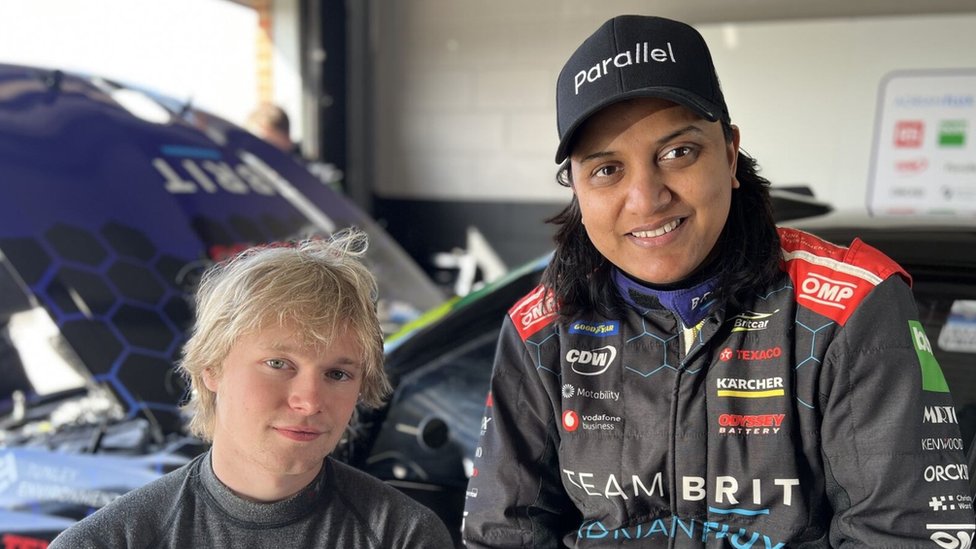Britain's only disabled-only competitive racing team gathered at Snetterton Racecourse in Norfolk over the weekend to compete in the BritCar Trophy Championship with able-bodied drivers. The BBC met the driver of his team BRIT to hear how motorsport provides equality for people with physical and psychological problems.
“There's nothing stopping us from being the fastest.”
Noah Cosby, 19, from Towcester, Northamptonshire, always dreamed of competing in motorsport.
Then, in March 2021, everything changed when she fell while jumping and broke her hip. The 16-year-old was paralyzed from the base of his ribs down.
“I felt like I lost a big part of myself,” he says.
“I was also in my first year of A-levels so I had to juggle that so I took a year off from school, but I passed and that’s when I started focusing on myself and not my studies.”
A friend introduced him to a racing simulator, but just three months after passing his driving test, he switched to a modified racing car, reaching speeds of 150 mph (241 km/h). .
He is currently competing on a BMW M240i with teammate Asha Silva from Kettering.
“It's a completely different way of driving so you have to get used to it, but I've never learned to drive a car with my feet,” he says.
“I think motorsport is the only sport where I can have a completely level playing field and we are proving that.
“There's nothing stopping us from being the fastest.
“It doesn’t matter who you are as long as you can drive a car.
“This is a big part of the confidence I've gained since the accident, and it makes me feel like I'm back to where I was before the accident.
“My dream is to push the limits even further and GT3 is where I want to get to.
“It's totally achievable. You just need some time behind the wheel.”
“It's a dream come true”
Asha Silva started as a rookie after discovering his potential as a race driver through computer simulations.
Like Noah, she had long wanted to compete in the real fast lane, but it took her a little longer to get there.
After struggling with her mental health, her wife encouraged her to seek help and she was eventually diagnosed with ADHD and adult autism.
She said the situation gave her “hyper-focus”, which was an asset behind the wheel.
“I use the pedals, and next to the steering wheel there is a rocker switch for gear up, gear down, etc., and it works like that.
“My usual job is to think about the 110 in my head, but as soon as I get behind the wheel, there's one thing that's on my mind.
“All the noise disappears, and you can focus all your attention on the commands coming in over the radio, which are reflected directly in the output on the truck.
“Passion is what matters. When we are passionate about something, we tend to focus on that.
“I'd like to say this is a superpower, but it's just the way my brain works.”
She says Team BRIT is a special place and “just one big family.”
“Inclusion is a top priority,” she added.
“We all have different walks of life, we understand each other's journeys, and we give each other time and space.
“When I was growing up, people asked me what I wanted to do when I grew up, and the actual answer was, “I want to be a race driver or a pilot.''
“I turned 40 and I got to do that. It means everything to me.
“It's a dream come true.”
“Three weeks after the amputation, I was racing.”
Paul Frick, 40, from Southampton, was a member of the British Army until a diving accident forced him into early retirement.
He remained very active and competed in charity driving and horseback riding challenges, including going to Gambia in a car that cost him £100.
Then in 2021, he lost his right leg in a motorcycle accident while on tour in Wales.
“Team BRIT means everything to me. It's been therapy and an adventure,” he says.
“I used to be a motorcycle racer, but since my amputation I can no longer do that.
“I found Team Blitz, emailed them from the hospital, and three weeks later they put me in the car and went racing.
“It gave me something to focus on. Rehabilitation is 100 percent focus. Having something to really focus on gave me everything I needed.”
He said being able to race every weekend in his McLaren 570s GT4 meant his rehabilitation was never boring and, importantly, he was able to compete as well as before.
“Once you're in the car, other drivers don't know you're impaired,” he added.
“Being able to go out there anonymously and compete as a human being and not as a disabled person is really, really important.
“I can’t think of any other sport where you can compete on such a level playing field.
“Our goal is to become the first disabled team to compete in Le Mans. I would love to be a part of making history.”
Follow news from the East of England Facebook, Instagram and X. Do you have a story? Email eastofenglandnews@bbc.co.uk or WhatsApp 0800 169 1830


